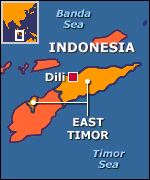 Timor Leste should have been celebrating its fourth independence anniversary on May 20. Instead their leaders are working hard to bring back peace after a military rebellion deteriorated into widespread clashes by regional rivals. The troubles began last month when around 600 of Timor Leste's 1,400-strong army were sacked after they went on strike to protest over alleged discrimination against soldiers from the east of the country. The disgruntled soldiers fought sporadic battles with the military last week but the violence quickly spread to clashes between rival gangs from the east and west. With almost the entire 2,500-strong contingent of peacekeepers from Australia, Malaysia, New Zealand and Portugal now on the ground, terrified residents were simply hoping for a sense of security so that
Timor Leste should have been celebrating its fourth independence anniversary on May 20. Instead their leaders are working hard to bring back peace after a military rebellion deteriorated into widespread clashes by regional rivals. The troubles began last month when around 600 of Timor Leste's 1,400-strong army were sacked after they went on strike to protest over alleged discrimination against soldiers from the east of the country. The disgruntled soldiers fought sporadic battles with the military last week but the violence quickly spread to clashes between rival gangs from the east and west. With almost the entire 2,500-strong contingent of peacekeepers from Australia, Malaysia, New Zealand and Portugal now on the ground, terrified residents were simply hoping for a sense of security so thatthey could return to their homes. This unfortunate episode clearly reflects the difficulties of fledgling nations to maintain peace and order. It is just as tough, or even harder, than the efforts put in towards the hard-fought independence.
On an assignment to cover former prime minister Dr Mahathir Mohamad's visit to the tiny island nation in October 2003, I remember him stating Malaysia's pledge to continue with its "prosper-thy-neighbour" philosophy. He had said a prosperous neighbour would benefit Malaysia because it could become the market for Malaysian-made goods and would not cause any problems that could spill over to other countries. Dr Mahathir was the first foreign head of government to make an official visit to the country which gained independence from Indonesia in May 2002. The three-day trip from Oct 22 to 24, 2003 was among the last he made before stepping down as prime minister a week later after 22 years in office.
Dr Mahathir said his visit to Timor Leste reminded him of the situation in Malaysia before it attained progress. "We are sometimes quick to forget... when we have achieved progress, we become conceited and behave as though all this is normal and forget our poverty and the difficulty we endured in overcoming this poverty," he said.

No comments:
Post a Comment